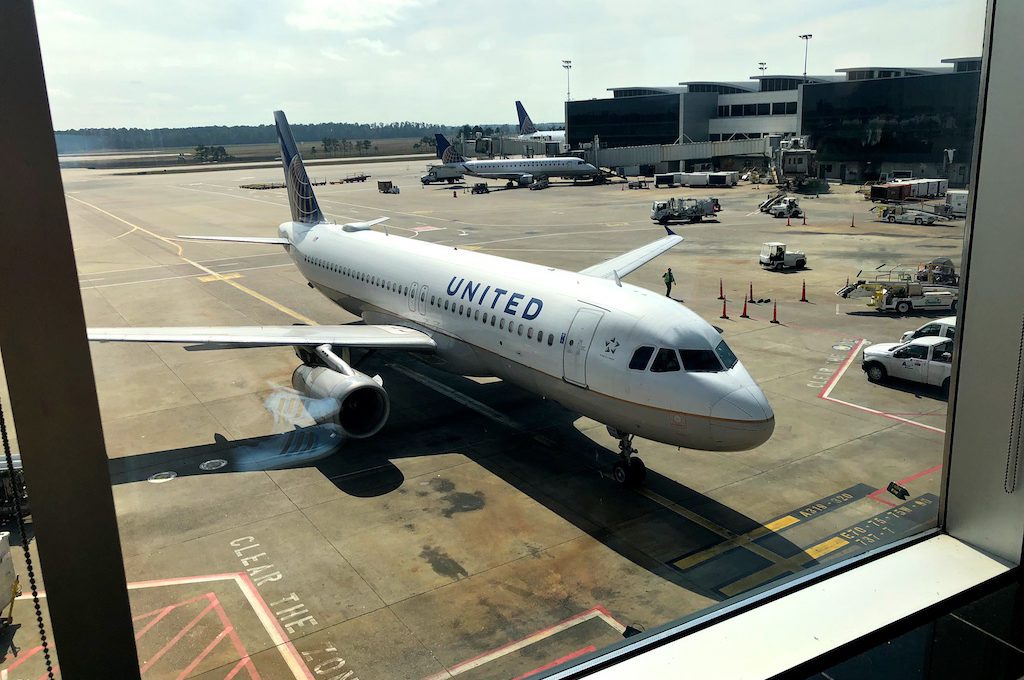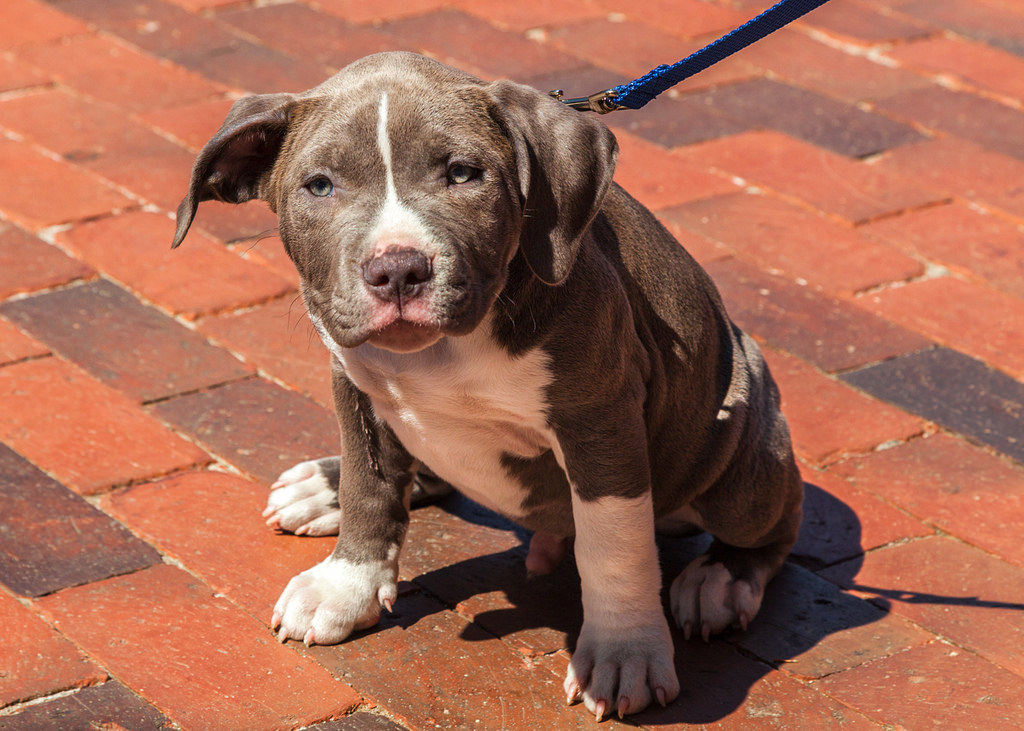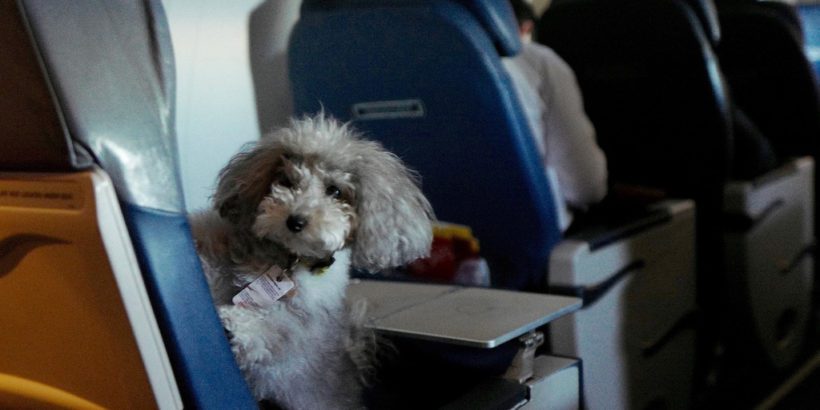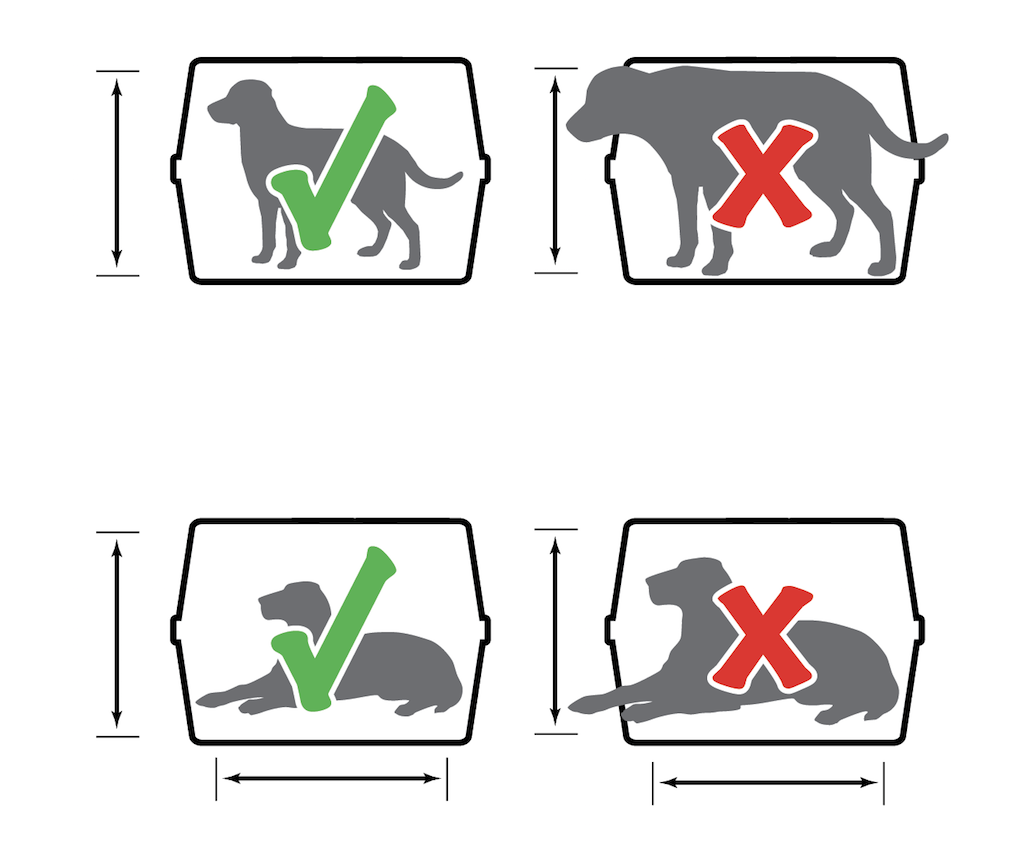There are a few different United Airlines pet policies depending on how and for what purpose you’re bringing along your animals.
This article will take a detailed look at the pet policy for shipping animals on United.
I’ll cover in-cabin transport (carry-on), PetSafe (cargo), international, service animals, and show you where to go to get all of the forms and documents you’ll need to transport your animals.
Table of Contents
What is the United Airlines pet policy?
United Airlines will allow pets to fly in-cabin but they no longer offer the ability to fly pets in the cargo hold as part of the PetSafe program (except for limited exceptions for the military).
The pet policies require you to follow some very specific rules and guidelines so if you’re thinking about transporting your pets on United you need to pay very close attention to the different rules.
If you need to read more about United’s baggage policies in general you can do that here.
Tip: Use the free app WalletFlo to help you travel the world for free by finding the best travel credit cards and promotions!
How to avoid United pet fees
One of the easiest ways to avoid pet fees is to use the right credit card. The Capital One Venture Rewards Credit Card is a good card for general travel expenses and its points can be used to offset airline pet fees since they will often code as travel.
You can also use an incidental credit attached to a travel credit card. For example, the Platinum Card has a $200 incidental credit.
Other cards like the Chase Sapphire Reserve have a $300 travel credit that could be used on virtually any type of travel purchase including pet fees.
United in-cabin animals
In the past, United stated that they would allow domesticated cats, dogs, rabbits and household birds (excluding cockatoos) to travel accompanied in the aircraft cabin on most flights within the U.S.
They recently changed their website and now do not list out all of the different animals so it’s not clear to me what pets they allow beyond cats and dogs. For that reason, you may want to call and clarify what animals are allowed.
Fees
The fees for an in-cabin pet are $125 each way. Also, there is an additional $125 service charge for each stopover of more than four hours within the U.S. or more than 24 hours outside of the U.S.
Booking
Booking a ticket for your pet is very easy to do with United.
Whenever you are making a booking, just be sure to select “Travel with a pet” as a traveler. If you already made a booking, you can still go to My Trips and add a pet to an existing trip. You cannot add a pet using the United app.
Do everything you can to make this reservation in advance because there are limited slots available for pets on aircraft.
Check-in
Whenever you arrive at the airport, be sure to check in and get your pet tag. Remember, you’ll need both your own and your pet’s confirmation numbers.
Also remember that your pet is expected to remain in the kennel while in the airport. If you need to take them to a relief area you can check the airport maps feature on the United app to see if you can find one.
Kennel rules
Before your bring your pet on-board, make sure that you are towing them in a kennel that complies with the United pet policy rules.
The kennel must fit completely under the seat in front of the customer and remain there at all times and the door needs to be secured as well.
Also, the animal must be able to stand up and turn and around inside the kennel. There may only be one pet per kennel.
There are also specific dimensions required for these pets:
- Hard-sided kennels: 17.5 inches long x 12 inches wide x 7.5 inches high (44 cm x 30 cm x 19 cm).
- Soft-sided kennels: 18 inches long x 11 inches wide x 11 inches high (46 cm x 28 cm x 28 cm).
United will allow you to bring along soft-sided pet carriers that slightly exceed these dimensions so long as they don’t block the aisle.
While your pet must remain under the seat, some people will purchase an extra seat because it makes it easier to deal with their pet.
For one, it gives the passenger space to put a personal item underneath the difference seat. It also allows them to more easily bend over to check on the animal.
No unaccompanied minors
Pets are not allowed to travel with unaccompanied minors.
Age limits
Puppies and kittens traveling within the U.S. and Puerto Rico must be at least 2 months (8 weeks) old to be accepted for travel on United. Puppies and kittens traveling internationally must be at least 4 months (16 weeks) of age to be accepted for travel on United.
International travel
Pets are not permitted on flights to, from or through Australia, Hawaii, New Zealand and other locations. Please verify if your destination allows in-cabin pets prior to travel.
Rules for international in-cabin pets vary. To book international in-cabin travel for a pet, contact the United Customer Contact Center or call 1-800-864-8331 to add a pet to your reservation.
Health declarations
The Centers for Disease Control and Prevention (CDC) require all dogs entering the U.S., except those arriving from certain rabies-free countries, to be immunized against rabies.
Vaccinations must be completed at least 30 days before arrival in the U.S.
Since puppies cannot be vaccinated against rabies before 3 months of age, puppies under 4 months old will not be admitted into the U.S. unless they are arriving from a rabies-free country.
Each dog entering the U.S. must be accompanied by a valid certificate of rabies vaccination, signed by a licensed veterinarian and including the following information:
- Name and address of the dog’s owner
- Identifying information for the dog, including breed, sex, age, color and markings
- Date of vaccination and the name of the vaccine used
- Date when the vaccination expires. If no expiration date is stated, the vaccination must have been completed within 12 months before arrival in the U.S.
Visit the CDC website for more information.
Cats are not required to have proof of rabies vaccination for importation into the U.S; however, some states require vaccination of cats for rabies, so it is a good idea to check with state and local health authorities at your final destination.
Restrictions based on aircraft
You should note that there are some restrictions for specific types of aircraft that you’ll be flying on.
Keep in mind that many routes are served by different types of aircraft so you’ll always need to check and see exactly what type of aircraft you’re flying on.
You can do this be utilizing Google Flights or you can simply check on the United website.
Here are the restrictions:
- In-cabin travel for pets is booked on a space-available basis.
- A customer traveling with an in-cabin pet cannot be seated in the bulkhead or an emergency exit row.
- Two pets per flight are allowed in premium cabins on select aircraft. Pets are not permitted in premium cabins on Boeing 757, 767, 777 or 787 aircraft due to limited storage space under the seat.
- Four pets per flight are allowed in United Economy® on all United flights.
- A customer traveling with an in-cabin pet in United Economy on Boeing 757-200 aircraft will need to be seated in a window seat due to limited storage space under aisle and middle seats.
- The number of in-cabin pets allowed varies by United Express partner airline.

United PetSafe (cargo) [no longer available]
2023 Update: United no longer accepts PetSafe reservations.
United recently made changes to its PetSafe program so make sure that you’re up to date on all of the changes.
You can request your PetSafe booking here, but I highly advise that you read all of the details below before making a booking.
Pet age
Puppies and kittens traveling within the U.S. and Puerto Rico must be at least 8 weeks of age to be accepted for travel on United.
Puppies and kittens weighing less than 2 pounds must be at least 10 weeks of age. International requirements can be complex, so please contact an International Pet and Animal Transport Association (IPATA) shipper for assistance.
Cats and dogs (breeds allowed)
Only cats and dogs are allowed
United will no longer accept reservations for the following brachycephalic (or short- or snub-nosed) dogs and cats and strong-jawed dog breeds:
- Affenpinscher
- American Bully
- American Pit Bull Terrier/Pit Bull
- American Staffordshire Terrier/”Amstaff”
- Belgian Malinois
- Boston Terrier
- Boxer
- Brussels Griffon
- Bulldog
- American Bulldog
- English Bulldog
- French Bulldog
- Old English Bulldogges
- Shorty Bulldogs
- Spanish Alano/Spanish Bulldog/Alano Espanol
- Cavalier King Charles Spaniel
- Chow Chow
- English Toy Spaniel/Prince Charles Spaniel
- Japanese Chin/Japanese Spaniel
- Lhasa Apso
- Mastiff
- American Mastiff
- Boerboel/South African Mastiff
- Bullmastiff
- Ca de Bou/Mallorquin Mastiff
- Cane Corso/Italian Mastiff
- Dogo Argentino/Argentinian Mastiff
- Dogue de Bordeaux/French Mastiff
- English Mastiff
- Fila Brasileiro/Brazilian Mastiff/Cao de Fila
- Indian Mastiff/Alangu
- Kangal/Turkish Kangal
- Neapolitan Mastiff/Mastino Napoletano
- Pakastani Mastiff/Bully Kutta
- Pyrenean Mastiff
- Presa Canario/Perro de Presa Canario/Dogo Canario/Canary Mastiff
- Spanish Mastiff / Mastin Espanol
- Tibetan Mastiff
- Tosa/Tosa Ken/Tosa Inu/Japanese Mastiff/Japanese Tosa
- Pekingese
- Pug
- Dutch Pug
- Japanese Pug
- Shar-Pei/Chinese Shar-Pei
- Shih-Tzu
- Staffordshire Bull Terrier/”Staffys”
- Tibetan Spaniel
Cat Breeds
- Burmese
- Exotic Shorthair
- Himalayan
- Persian

Temperature restrictions
United’s PetSafe program uses climate-controlled vans and keeps animals in holding areas within a temperature range of 45-85° F but United may decline to transport your pet if the outside temperatures are too extreme.
United will no longer accept reservations to and from the following airports annually between May 1 and Sept. 30, due to high summer temperatures.
- Las Vegas (LAS)
- Palm Springs (PSP)
- Phoenix (PHX)
- Tucson (TUS)

Reservations
Reservations are accepted between 30 days in advance (maximum) and five (5) days (minimum) prior to travel
Documents
United will require you to submit several documents to United PetSafe prior to travel which include:
- Scanned copy of the completed, signed and dated Customer Acknowledgement Form
- Scanned copy of your pet’s Health Certificate from a licensed veterinarian dated within 10 days of travel (or the timeframe required by the destination country)
- Digital photo of your pet clearly showing their face to verify breed
- Digital photo of your pet’s travel crate to verify compliance with Petsafe’s crate requirements
You can find out more about these documents here.
No India or Australia
Not accept any reservations to and from India and Australia at this time
Connections
United will not accept PetSafe itineraries with more than three flight segments (or two connections).
Also, cats and dogs are required to have a comfort stop if the total length of their journey is more than 24 hours. However, you can purchase a comfort stop if you’re worries about your pet’s health on a long journey.
International routing
United requires international routing to be arranged through an International Pet and Animal Transportation Association (IPATA) pet shipper only. A list of IPATA members near you can be found at https://www.ipata.org
Crate guidelines
United will not accept a crate taller than 30″, including the 700 series crates. Also, they do not sell or lend crates at airports. Instead, crates can be purchased at united.com/petmate.
Find out more about the crate guidelines here.
If you need help selecting a good crate watch this.
PetSafe Documents
United requests that you complete two forms.
One is a Customer Acknowledgment Form and the other is a Pre-Travel Checklist
I suggest that you print out both forms but for your reference here is the checklist:
Before you book (30 days prior to travel)
- Review new PetSafe acceptance policies
- Confirm your pet is acceptable for travel based upon age, breed, health and international travel restrictions
- Assess the overall health of your pet and if your pet is fit to fly
- Confirm the trip length and temperature is appropriate for your pet
- If you are shipping your pet internationally, engage an IPATA shipper for assistance with travel requirements and to make your booking
Preparing your pet for travel: Crate requirements (at least two weeks prior to travel)
- Review PetSafe Customer Pre-Travel Information Packet
- Obtain an airline-compliant crate that meets all guidelines and requirements
- Ensure crate is the appropriate size for your pet and does not exceed 30 inches in height
- Begin “crate acclimation” process as soon as possible to reduce your pet’s stress during travel
Preparing your pet for travel:
- Documentation and other requirements (5-10 days prior to travel)
- Fully complete and sign the Customer Acknowledgement Form
- Prepare digital copies of two photos to submit to PetSafe (one clearly showing your pet’s face to verify breed, one showing your pet’s travel crate to verify compliance with PetSafe’s crate requirements)
- Obtain the required Health Certificate from a licensed veterinarian within 10 days of travel (or the time frame required by the destination country)
- Email the four required items to [email protected] at least five days before travel. Include your confirmation number in the subject line of the email
- Required items include the Customer Acknowledgement Form, a Health Certificate from a licensed veterinarian, the photo of your pet and the photo of your pet’s crate
- Each attachment must be 2 MB or less and total email size cannot exceed 19 MB
Day-of-travel preparations
- Follow guidelines for pre-travel feeding and watering of your pet Gather all documents and photos you must present when you drop off your pet:
- Two copies of the signed and completed Customer Acknowledgement Form
- Print two copies of a photo of your pet, clearly showing your pet’s face (image should be no smaller than 3” x 3” and no larger than 4” x 6”)
- Health Certificate completed and signed by a licensed veterinarian
- Any additional required documents for travel / entry to the destination (for international travel, required documents should be confirmed by your IPATA shipper)
- Check unitedcargo.com for the drop-off location and time for your pet
- Prepare approved food and water containers for the inside of the crate
- Ensure that only allowable items are placed in or attached to the crate At the airport on travel day
- Confirm PetSafe drop-off location and time
- Arrive at least 30 minutes in advance of the minimum drop-off time to allow for processing
- Ensure person dropping off your pet has a current, government-issued photo ID to present at check-in
Tip: Check out the free app WalletFlo so that you can optimize your credit card spend by seeing the best card to use! You can also track credits, annual fees, and get notifications when you’re eligible for the best cards!
United Service animals
United Airlines has several different types of classifications for service animals and they have different regulations depending on the type of service animal.
Trained service animals
Trained service animals are animals that receive specific training to perform life functions for individuals with disabilities, such as:
- Visual impairments
- Deafness
- Seizures
- Mobility limitations.
Trained service animals are accepted in cabin for qualified individuals with a disability.
The service animal should sit in the floor space in front of the customer’s assigned seat but cannot protrude into the aisles. Customers may use an approved in-cabin kennel for smaller animals provided its use meets stowage requirements.
Exit row seating is prohibited.
Note that documentation may be required for an animal traveling to international destinations.
Emotional support animals and psychiatric service animals
Emotional support animals and psychiatric service animals that provide emotional, psychiatric or cognitive support for individuals with disabilities, but may or may not have task-specific training with respect to a disability.
Emotional support and psychiatric service animals are also accepted in cabin for qualified individuals with a disability if certain information and documentation are provided in advance of travel.
With prior documentation and clearance a customer may travel with no more than one emotional support animal.
Additional documentation beyond United’s requirements may also be required for an animal traveling to an international destination, Hawaii and other locations.
Customers traveling with an emotional support animal or a psychiatric service animal must provide the required documentation at least 48 hours before the customer’s flight by email ([email protected]).
Service animals in training
Animal trainers are permitted to bring one service animal that is training to assist disabled passengers onboard free of charge. These service animals must not occupy a seat. Trainers transporting service animals in the ordinary course of business or service animals who are not in training must check these animals.
Therapy animals
Therapy animals, which are pets that have been trained and registered by a therapy organization in order to visit nursing homes, hospitals, schools and other facilities, are not considered to be service animals.
When traveling with a therapy animal, standard pet-related regulations and restrictions will apply.
You can click here to read more about United service animals.
Customer service number
For questions, please contact the United Customer Contact Center number at 1-800-UNITED-1 (1-800-864-8331).
Is United Airlines safe for pets?
You might be wondering if it’s even safe to transfer your pet on United Airlines.
According to the DOT, United had the most animal deaths of all U.S. airlines in 2017 for the third year in a row on scheduled domestic or international passenger flights.
United had a total 18 deaths of animals in 2017, which amounts to 2.4 animal incidents per 10,000 animals transported in 2017. Delta Air Lines had 1 animal death in 2017 and American Airlines had 2 deaths of animals in 2017.
Since United has the wort track record in recent memory, I’d personally try to avoid transporting my furry friends with them in all honesty. But just in case you can’t avoid it, the odds are still very low that there will be an incident since we’re talking about 2.4 animal incidents per 10,000 transported animals.
Still, even with those odds some advise against transporting your animals in the cargo hold.
The Humane Society of the United States “strongly discourages” having your pet travel by air in the cargo hold of a plane, since the experience can be so stressful.
United Airlines Pet Policy FAQ
The fee is $125 each way for an in cabin pet.
You can use airline credits to avoid the fee with some credit cards such as the Amex Platinum Card.
No, an unaccompanied minors cannot travel with a pet.
United Airlines doesn’t allow in-cabin pets on flights to, from, or through:
Australia
Barbados
Cuba
Guam
Federated States of Micronesia
Hawaii
Hong Kong
Iceland
Ireland
Jamaica
Marshall Islands
New Zealand
Norway
Palau
Panama
Philippines
Singapore
South Africa
Sweden
Tahiti
Trinidad and Tobago
UK
Pets are not allowed in business class or first class on select aircraft including: Boeing 757-200, 767, 777 or 787.
Final word
As you can tell, there are a lot of restrictions and regulations for transporting pets on United flights. You should always be sure to check what the most up-to-date rules are since they can change from time to time.
Cover photo by Lynn Friedman via Flickr.
Daniel Gillaspia is the Founder of UponArriving.com and the credit card app, WalletFlo. He is a former attorney turned travel expert covering destinations along with TSA, airline, and hotel policies. Since 2014, his content has been featured in publications such as National Geographic, Smithsonian Magazine, and CNBC. Read my bio.


